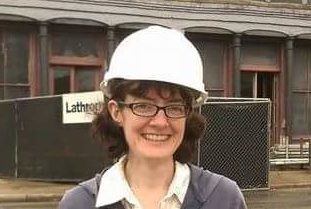Lisa Brownell
Program Manager, Ohio Historic Preservation Tax Credit at Ohio Development Services Agency

Education: Ph.D. in Geography (University of Kentucky), M.A. in Geography (University of Kentucky), B.A. in Individually Designed Interdepartmental Major with focus on Community Planning (University of Minnesota)
Describe your job. What are some of the most important tasks or duties for which you are responsible?
I am responsible for managing the Ohio Historic Preservation Tax Credit program. I work with applicants at all stages of the process, administer the application, oversee the competitive scoring, and work closely with the state historic preservation office, our partner in the program.
What attracted you to this organization?
They pay me to go out and poke around abandoned buildings! What could be more fun? And then I get the joy of seeing these buildings rehabbed and brought back to a place of value in their communities.
Historic buildings and landscapes have always been so compelling to me as well as the ways that communities value and engage with places. This job sometimes means hours putting numbers in boxes but overall lets me help communities reinvest in places they love.
How has your education/background in geography prepared you for this position?
A background in historic/cultural geography has helped me to understand urban development patterns and historic architecture. The big picture/holistic approach that geography offers has been valuable as we work in cities and places that experience conditions that are the result of a wide variety of variables. Instead of looking at the scale of just the building, or even the specific architectural elements of the building, I can help my team look at the broader neighborhood, city, and regional scales to understand a project or a problem better.
What geographic skills and information do you use most often in your work? What general skills and information do you use most often i your work?
Geographic skills: Using and making maps, spatial thinking, and understanding how places are nexuses for all sorts of flows and forces and meanings (economic, cultural, historical, politics, environment, memory, power, settlement patterns, etc.).
General skills: Problem solving and listening are big. Looking at big picture needs and translating that to day to day policy and procedure. The ability to help others learn but also to keep learning and being teachable are skills that are very important.
Are there any skills or information you need for your work that you did not obtain through your academic training? If so, how/where did you obtain them?
Local knowledge and familiarity with local stories and meanings plus how things “work” in different places. This came from experience and from reading, watching, working with people in the places, and listening over time.
Patience and people skills came from working in childcare, having my own children, and from working as an academic advisor.
What advice would you give someone interested in a job like yours?
Persevere. As a geographer in a field full of historic preservation folks (most with either history, planning, or architecture backgrounds) you have to work hard to educate others what a geographer can bring. Folks don’t understand that geographers know cities and buildings and economic development. We have to show them that we bring a holistic understanding of places that is valuable.
Intern, volunteer, get involved, and get to know people in the field. It’s a small field and there aren’t a ton of job openings.
What is the occupational outlook for career opportunities in your field/organization, esp. for geographers?
I’d say it’s good, in the sense that geographers make great candidates in historic preservation/government program admin. But it’s not a large field so the opportunities are somewhat limited.